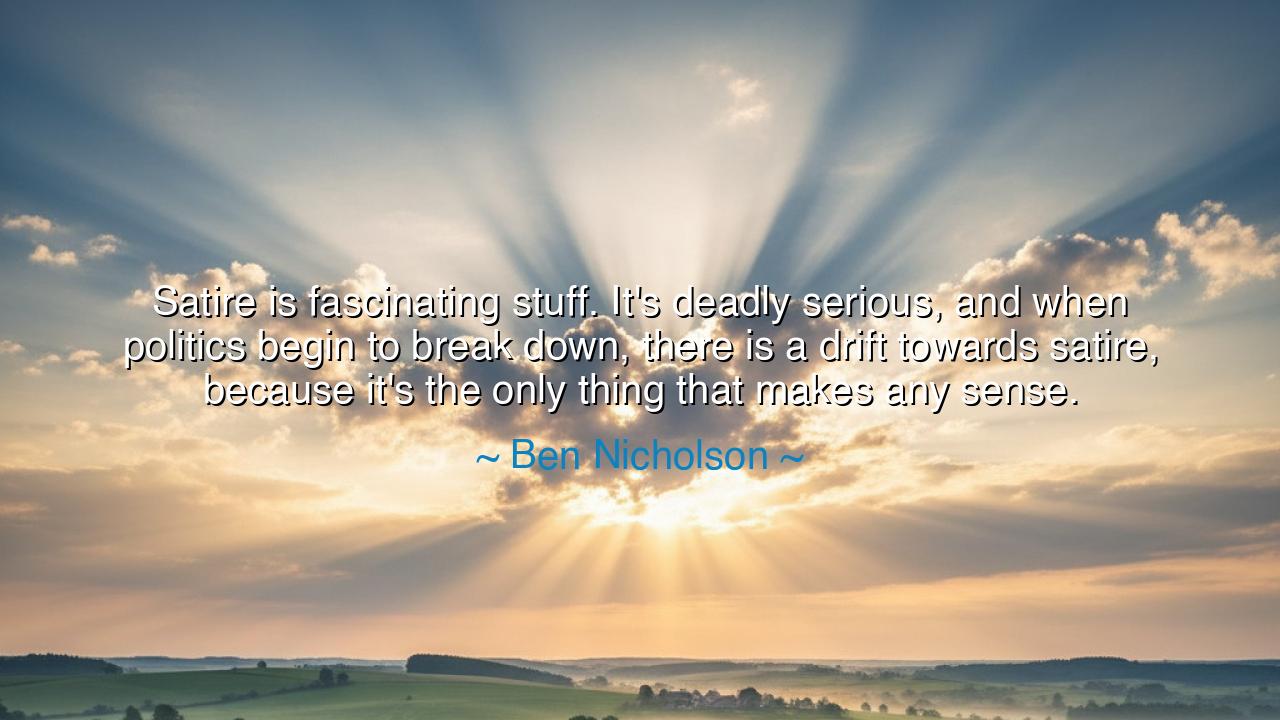
Satire is fascinating stuff. It's deadly serious, and when
Satire is fascinating stuff. It's deadly serious, and when politics begin to break down, there is a drift towards satire, because it's the only thing that makes any sense.






The words of Ben Nicholson reveal a paradox both bitter and profound: that in the ruins of failing politics, when reason falters and trust erodes, men and women turn to satire as their last shield of truth. What is laughter but the cry of the soul when all else is absurd? What is mockery but a mirror sharper than any blade, cutting away the mask of power to reveal the face beneath? Thus, when the order of the city trembles, satire rises, both playful and deadly, a jest and a judgment in one breath.
For the ancients knew this power well. In the streets of Athens, Aristophanes raised his voice in comedy, yet his words struck with the weight of iron. He clothed truth in laughter, so that the people, weary of corruption and endless war, might see with clarity what speeches and decrees could not reveal. His play Lysistrata was no mere entertainment—it was rebellion in the tongue of jest, a cry for peace clothed in the garments of ridicule.
So too in later ages, when kings and priests sought to bind men’s tongues, the spirit of satire broke free in whispers, songs, and pamphlets. Consider the pen of Jonathan Swift, who in his Modest Proposal spoke of eating children—not to shock the world into cruelty, but to unmask the cruel logic already ruling it. Here lies the essence of Nicholson’s vision: satire makes sense when nothing else does, for it dares to show the absurdity of power in its naked form.
Yet satire is not mere jesting. It is deadly serious, a double-edged blade that spares no tyrant. For while it provokes laughter, it also plants the seed of reckoning. Many a ruler has feared not the soldier’s sword but the poet’s tongue, for armies may be silenced by might, but mockery spreads like fire, igniting hearts with clarity and defiance.
Let this wisdom endure: when you see the world descend into confusion, when politics grow hollow and words no longer bear truth, look to the jester, the satirist, the fool who speaks in riddles. For often it is their laughter that carries the last torch of reason. And remember, O seeker, satire is not the weakness of the people—it is their strength, their way of enduring, their way of resisting, their way of making sense when the world itself no longer does.






GDGold D.dragon
I love the idea that satire has a certain weight when politics become confusing or even chaotic. It’s like satire brings clarity when everything else feels tangled. But does the fact that we turn to satire suggest that we have lost trust in the traditional political system? If we rely on satire too much, do we risk losing the drive to actively engage in politics and work toward real solutions?
Qquynhanhdo
Ben Nicholson’s observation on satire being the only thing that makes sense when politics are falling apart is spot-on. Satire can help people laugh in the face of absurdity, but I’m curious—does it have the power to create meaningful change, or is it just a coping mechanism? How do we move from satire to action? Can humor in politics lead to any real reform, or is it just a way to vent frustrations without any tangible outcome?
HLDang Thi Hong Lien
The idea that satire becomes essential when politics break down really makes me think. It’s almost like humor and irony are the only things left to hold onto when everything else seems out of control. But I also wonder, could over-reliance on satire risk undermining our ability to seriously engage in politics? Is there a danger of turning everything into a joke and forgetting the real consequences of political decisions?
TTran
Ben Nicholson’s quote really captures the dual nature of satire—both comedic and deeply serious. When the political system falters, it’s fascinating how satire steps in to make sense of things. But how do we draw the line between using satire to critique the system and allowing it to become just another way to mock the very system that needs fixing? Can satire truly lead to political change, or does it simply reinforce the status quo?
DPVo Dai Phu
I agree with Ben Nicholson's idea that satire can become more prominent when politics seem nonsensical. Satire often cuts through the noise and makes you see the truth in a way that straightforward political discourse sometimes doesn’t. But then, is there a risk of satire becoming a crutch? Are we allowing it to replace real action or constructive dialogue? Does it sometimes just serve as a distraction rather than a tool for real change?